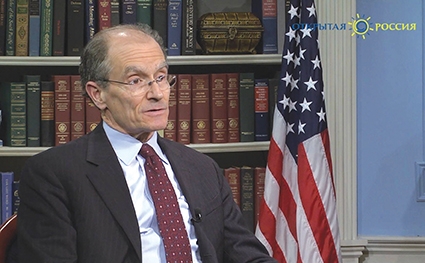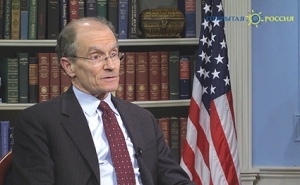Advice to Georgia & Dealing with Russia
Georgia should pursue what it can and take advantage of the opportunities available, not let itself be undermined as it waits for better days, says US State Department Sanctions Coordinator Daniel Fried. In an exclusive interview, Fried also spoke about consequences of the August 2008 war and US-Russia relations.
You were an assistant Secretary of State at the time of the August 2008 war. How do you recall events leading up to the war?
We could see the tension mounting; we could see a series of provocations, designed to increase tensions and set the stage for war. We tried to prevent it using diplomacy, both working with the Russians and directly with the Georgians. I was with Condoleezza Rice that July when she flew out to Tbilisi and cautioned then-President Saakashvili not to fall victim to the Russian provocations. She said to him, “You don’t have a military option, so don’t pretend you do.” I understand why he made the decision [to launch a military operation], but I still think it was a mistake.
There is an opinion among experts in the US, in Europe and in Georgia that the US support, which was perceived as unconditional at the time, emboldened President Saakashvili to be belligerent
I disagree on two grounds – one, our support was not unconditional and second, he was not actually belligerent. I think Saakashvili made a mistake ordering his military into action, but he was not belligerent. It was the Russians who consistently provoked the Georgians.
The argument of Saakashvili’s belligerence is false. That said, I think he was wrong to go in. I think the OSCE report that blames them in falling victim to Russian provocations is essentially accurate. But to say that he was belligerent absolves Russia of responsibility for starting the war, which I think they did.
It’s also a misreading of the Bush administration. I remember the charge that somehow there was a secret green light to Saakashvili yet Rice clearly gave them a red light for military action. They felt they had to ignore that and they paid the price.
The Six Point Ceasefire Agreement was negotiated by then-President of France, Nicolas Sarkozy. What do you think about that agreement?
It was flawed. It had a number of loopholes that the Russians could exploit and we - the United States - helped fix it. I should also say that France was in a difficult position of trying to negotiate this cease-fire very quickly, on-the-fly and under difficult conditions. Yes, it was not a great deal, but on the other hand, the French did stop the shooting. As a result of the ceasefire, flawed as it was, we managed to save the rest of Georgia. That was an achievement.
Some of the points of the ceasefire agreement, including withdrawal of military forces to pre-war positions, have still not been implemented by Russia
That’s right. There are some similarities with the Minsk agreement, which are far better than the ones negotiated in Georgia. The French and the Germans learned from their experiences in Georgia, and Minsk is far more workable. However, you will notice that the Russians have not yet lived up to their obligations.
Do you think the western reaction to the August 2008 war was adequate - especially after Russia recognized Abkhazia and South Ossetia as independence states?
Let me put it this way – the western reaction to the Russian aggression in Ukraine was stronger. The reason it was stronger is because we were united in respect to Ukraine and we were divided in respect to Georgia, because we had just had a bruising battle within the Western alliance about Georgia. Chancellor Merkel always had some degree of skepticism about President Saakashvili. Historians will write assessments of Saakashvili. He had his good side and did a lot for Georgia. But he also made a lot of mistakes. There were divisions within the West over Georgia and we were not as smart about sanctions. That was, of course, the fight at the NATO [Bucharest] Summit. We did not, for example, respond to Russia’s recognition of South Ossetia and Abkhazia with sanctions. In retrospect, we might have imposed sanctions, but we did not have the Western unity to do it. So, we went another route. Instead, we supported the Georgian economy and helped stabilize it. Georgia was a campaign issue in 2008. The McCain campaign was taking a very pro-Georgian position. The Obama campaign had different voices. But then Senator Joe Biden, running for vice president, took a strong public position and said we were to give Georgia USD 1 billion to help the economy. I can tell you that in the White House the reaction was instant and strong. Everybody embraced it.
Do you think that impunity somehow encouraged Russia to develop a more aggressive policy towards its neighbors? Do you think Georgia 2008 somehow led us to Ukraine 2014?
I wish I didn’t have to say it, but I’m afraid you have a point.The Russians may have thought that they’d got away with it. And they may have felt that they could attack Ukraine and the western reactions would be similarly divided. They were wrong. I think they failed to anticipate the sanctions and I think they were caught off guard. The experience of Georgia took a while to penetrate the western consciousness. Now, the Georgians might say what good did that do to us? I actually think it does do good for Georgia as it shows that the West is capable of stronger response to the Russian aggression. And I think that is helpful to Georgia.
You were instrumental in NATO enlargement in the late 1990s and early 2000s. You were also one of the biggest supporters of Georgia’s western aspirations and actively participated in developing the Bucharest Summit declaration language. Where do you think Georgia’s prospect of joining NATO is today?
The US under the Obama administration has defended the Bucharest Summit decisions. This is not a heroic period on either side of the Atlantic. Nativist and isolationist forces are strong in the US and EU. I don’t like it, but it is important to be realistic about the challenges we face. This is not a time, in the short-run, for major advances.
It’s certainly true that there was no move in Warsaw for the membership action plan (MAP). If the United States had pushed for it, we would have failed. What good would that do Georgia? If Georgia thinks that it is best served by pushing NATO for short-term gains, I think it’s a mistake. I think Georgia needs to look at the longer-term picture, strengthen its institutions, and do all it can given the circumstances in the West. I remember telling the Pols in 1992-1993, “Don’t push, your time will come, work on things at home, generate political capital for yourselves and wait for the cycle to turn.” It did!
My advice to Georgia is work on its democracy, its economy, to make strong democratic institutions. To do what it can in the time it has now, given the circumstances it now faces. And don’t think that the current difficulties in the West are permanent.
Another message for Georgia is that the NATO membership is a means to an end. What is the end Georgia wants? Georgians tell me that they want to be a free, sovereign country and a part of wider Europe. Alright! Pursue it in the avenues that are the most productive. Don’t pursue it in ways that create the most friction and sparks.
What is that way?
Pushing for immediate decisions by NATO is probably not going to work right now. So, why go down that route? Georgia should pursue what it can and take advantage of the opportunities available, not let itself be undermined as it waits for better days. They will come!
Ia Meurmishvili, Voice of America Georgian Service












